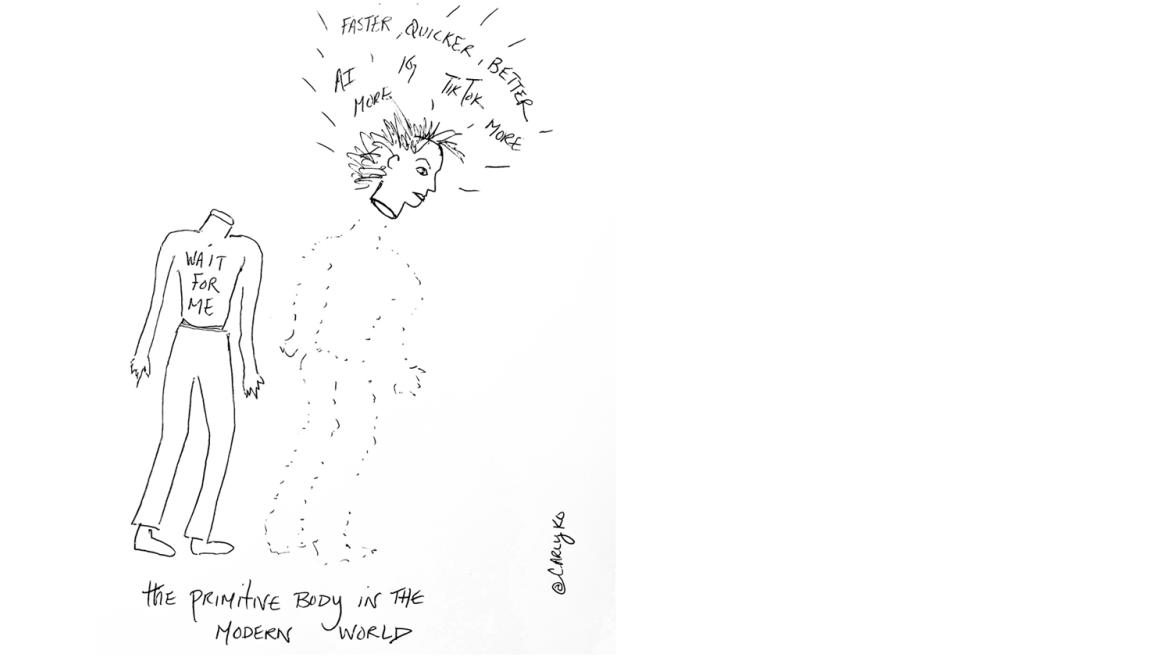“I’m in transition,” one might say—and we imagine a move, a breakup or leaving a job. We tend to imagine it as a challenging time, a space of uncertainty where we have not fully left the old or fully arrived in the new. As a therapist, I list transition as one of the main conditions I support people through.
Often the hardest part is leaving the familiar, no matter how uncomfortable it was. The nervous system prioritizes familiarity because it signals safety -- even when that “safety” includes an abusive relationship, a degrading boss or the town you’re tired of but still know by heart.
This brings us into the realm of attachment. In Buddhism, non-attachment is key to peace. But from a nervous system perspective, attachment is biological -- our systems are wired for connection. Attachment includes both craving and aversion -- desire and resistance. Sometimes moving on requires aversion. We may not know what’s next, but we know what we don’t want. That dissatisfaction shows up as judgment, criticism, stories -- your brain’s way of saying, “Something’s not right.”
Craving pulls us toward desire. And desire isn’t bad—it’s orientation. It helps us grow and expand. But suffering happens when the lack of what we want becomes unbearable. Neuroscience helps here: pain and suffering are not the same.
Pain is sensory—tight chest, clenched belly, burning skin. It is emotion felt in the body first. Suffering shows up when the prefrontal cortex adds meaning: “This shouldn’t be happening. Life is unfair. I’m a victim.” We move from sensation to story. And the story can keep us stuck.
What if we dropped the inner courtroom and just felt what’s there? Attachment theory is deeply tied to transition. Change can trigger early neural templates -- imprints laid down before we had conscious memory. If you experienced rupture without repair, abandonment or unpredictability in early relationships, transitions may activate that same threat response.
As Peter Levine says, trauma isn’t in the event but in the nervous system’s response. It often comes from too much, too fast, too soon—more than the system can process. That could be as subtle as a caregiver leaving without saying goodbye -- or as overwhelming as losing a loved one, a job, a home. The nervous system needs time to orient, discharge and regulate before it can fully step into something new.
We often think of trauma with a capital T. But life is made of small transitions, each with its own physiological ripple. Even moving from one activity to another -- home to car, car to store -- is a transition. Your brain starts motor planning before your body even moves. You’re already anticipating what’s next. That’s neuroception: the unconscious scanning for safety or threat.
But here’s the rub: we don’t let transitions complete. We move too fast -- from one app to the next, one meeting to the next, from grief to productivity. The body keeps score. And it needs more time to integrate than the mind thinks it should. We are a culture with no pause button. Pregnant people often return to work a month after giving birth. Our grief windows are timed to funerals. What are we skipping past?
This is where practices like ITP help. They create space -- to notice where you’ve been, where you are, where you’re headed, and what support you need. Through mindful movement, affirmations, intentional eating and community, ITP supports self-regulation by inviting presence, helping the body settle, recalibrate and reorganize.
In a fast world, integration is a radical act. We skim over emotions. We numb, dissociate, suppress. But our bodies are still absorbing it. And eventually, the body says no -- through pain, anxiety, digestive issues or burnout. But often, it was whispering long before it screamed.
Transitions are constant. The real question is: Are we tending to them? What would it look like to honor transition?
- Maybe it’s one breath before starting the car.
- Maybe it’s sitting down when you walk in the door and feeling what’s there.
- Maybe it’s taking three months to grieve a relationship.
- Maybe it’s walking in nature while listening inward, letting your body catch up with your life.
Just because the digital world is sprinting doesn’t mean your body can keep pace. Your biology evolved over millions of years. It needs time. It deserves reverence. Life is full of transitions. It’s up to us to give ourselves the resources and time to pass from ending to beginning with attention and care. Your body -- and nervous system -- will thank you.
